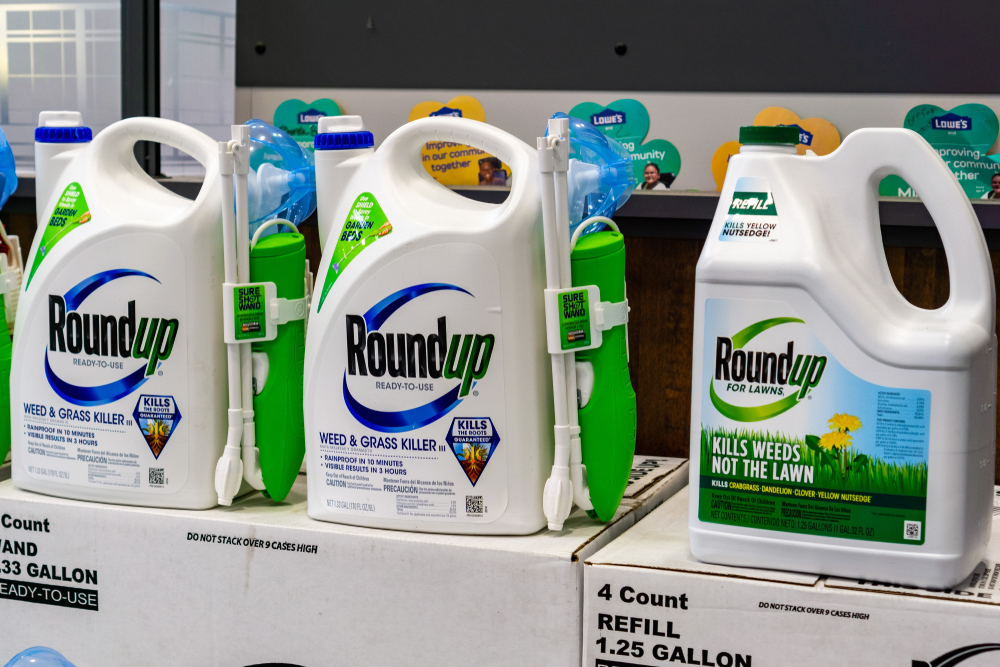We’ve seen the product in commercials, grocery store aisles and our backyards for years. Roundup, initially manufactured by the infamous Monsanto, is the most popular herbicide in the world. And you might assume that something so common in our everyday lives is perfectly safe.
But emerging research shows that may not be the case. Roundup has been increasingly linked to certain cancers, specifically non-Hodgkin's lymphoma (NHL), and other serious health problems. Bayer, the pharmaceutical giant that purchased Roundup from Monsanto in 2018, has faced Roundup lawsuits alleging that exposure to the product caused the plaintiffs to develop cancer.
What Are The Health Risks of Roundup?
The active ingredient in Roundup is glyphosate, and it’s an excellent killer of weeds and almost any other plants or grasses it comes into contact with. The chemical works by targeting a plant enzyme called EPSP synthase, which the plants cannot survive without for more than a few weeks. It’s used on nearly every type of crop, including oat, wheat, corn, fruits and vegetables, as well as greenhouses, aquatic plants and the typical household yard.
Of course, any herbicide is immediately dangerous if inhaled or swallowed. It can injure your eyes, burn your mouth and throat, and cause nausea, vomiting and diarrhea. And simply being around it for long periods can lead to long-term damage.
There is also glyphosate in most of the non-organic foods we consume. GMO crops are immune to glyphosate’s effects. The World Health Organization (WHO) found glyphosate in 43 out of 45 brands of popular oat-based products like oatmeal and cereal. It’s also found in grains and beans, nuts, fruits and vegetables, garlic and tobacco. Many foods tested with higher amounts of glyphosate than are considered safe for human consumption.
Dozens of studies on glyphosate have found a significant link between the herbicide and non-Hodgkin's lymphoma, along with several other adverse health effects:
- Thyroid disease
- Endocrine system (hormone) disruption
- Male and female reproduction/fertility issues
- Developmental abnormalities in children
- Liver disease
- Celiac disease, inflammatory bowel disorder and other gut problems
- Nervous system diseases like ALS
- Toxicity to bees and butterflies
We are exposed to much more glyphosate than we probably realize. According to the EPA, every year between 2012-2016, about 281 million pounds of glyphosate was applied to 298 million acres of American farmland. Five million pounds were used each year in residential settings. And worldwide, almost 10 million tons of Roundup was sprayed on fields over just ten years - about half a pound for every cultivated acre of land on the planet.
Roundup and Cancer: Controversy Among Experts
Controversy about Roundup took off in 2015 when the International Agency for Research on Cancer (IARC), part of the World Health Organization (WHO), announced that glyphosate is “probably carcinogenic.” However, it was later revealed that the IARC had purposely left out the evidence they found that contradicted their conclusion.
It didn’t help IARC’s case when the Environmental Protection Agency (EPA) strongly denounced their findings. The agency has always maintained that glyphosate is safe for humans when used according to directions and even declared that putting a cancer warning on Roundup’s label would be “false and misleading.” Many foreign government agencies like the EPA have also stated that glyphosate is not a carcinogen.
However, many of the studies cited by the EPA were conducted by or for Roundup manufacturers and have not been peer-reviewed or published. A group of European lawmakers launched an investigation into similar UK studies and found that just two out of 53 were acceptable under current international scientific standards. The rest were outdated and ridden with flaws.
Other European research was even plagiarized from Monsanto’s studies or performed by laboratories with a history of fraud. And the EPA itself determined in 2016 that its Office of Pesticide Programs, which is responsible for regular review and regulation of all pesticides, had not followed protocol when studying glyphosate and would have found it “likely” carcinogenic if they had. Yet their latest review of glyphosate in 2020 maintains its stance that the herbicide is safe.
Despite the EPA’s coverups, several reputable independent studies have supported the claim that long-term exposure to glyphosate increases cancer risk.
The Science Behind The Claims
The past few years have seen a steady output of research strengthening the link between glyphosate and non-Hodgkin’s lymphoma.
One 2019 study by the University of Washington found that regular glyphosate exposure raises NHL cancer risk by 41%. Scientists gathered several other related studies and did a meta-analysis with their own research, which included nearly 55,000 licensed pesticide applicators.
Bayer, which maintains the safety of glyphosate despite announcing its removal from household Roundup by 2023, called the body of research a “statistical manipulation” with “serious methodological flaws.”
The study’s authors admitted that the analysis was based on a very small number of existing studies, but many more were conducted in 2020 and 2021 that supported their conclusions.
Emails released during court proceedings revealed that the EPA and Bayer’s officials tried to stop the release of one particularly damning paper by the U.S. Agency for Toxic Substances and Disease Registry. And it’s no wonder they did; Bayer has been drowning in litigation for years by those whose lives were allegedly taken or destroyed by Roundup.
Roundup Lawsuits Continue
In the less than four years since the first lawsuit was filed against them, Bayer has lost billions of dollars settling cases. And more are still open. A few cases that made it to trial ended with stunning outcomes for the plaintiffs, including the very first, when a California groundskeeper with terminal NHL was awarded $289 million. A married couple with NHL received an initial $2 billion that was later reduced to $86.7 million.
Bayer has appealed each of its three trial losses. They won two cases in late 2021 when juries decided that there was insufficient evidence to confirm that Roundup caused the patients’ cancer.
In June 2020, the company committed more than $10 billion to settle most lawsuits. They also proposed a class action settlement of $2 billion for any future claims that was soundly rejected due to its clear advantage for Bayer.
Bayer also agreed to set up an independent panel of scientists to conduct a years-long study determining if glyphosate does cause NHL and how much exposure it takes to do so. If the panel concludes that it does not, plaintiffs could be banned from all future claims.
In December, Bayer asked the U.S. Supreme Court to stop all active lawsuits. The U.S. Solicitor General will file a brief giving the Biden administration’s opinion if the justices should hear the case.
In the meantime, many more claims against Roundup are expected to emerge.










